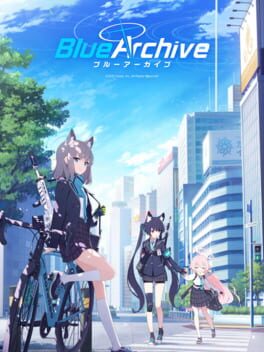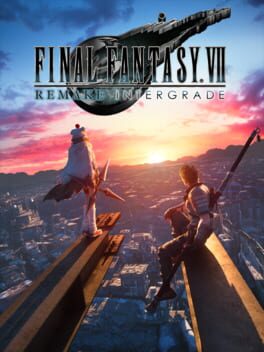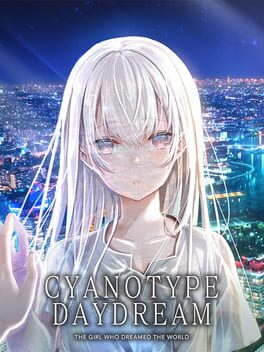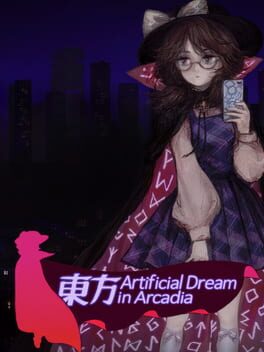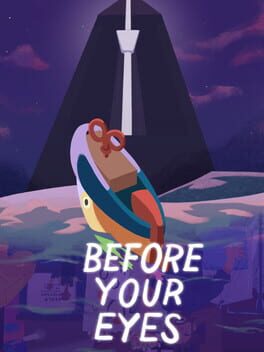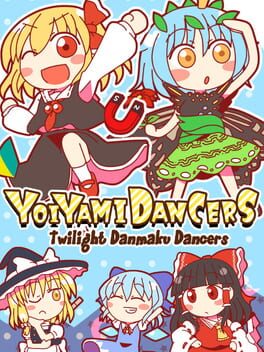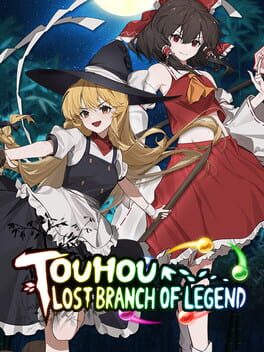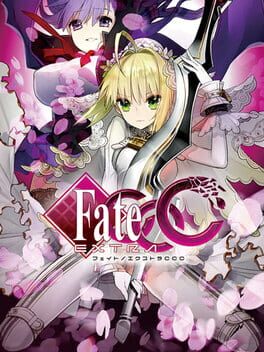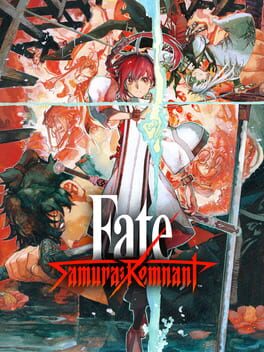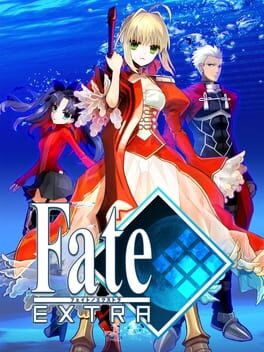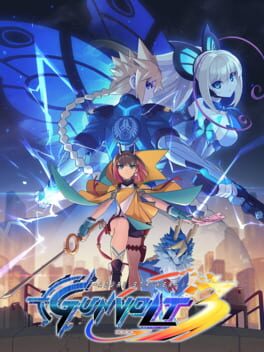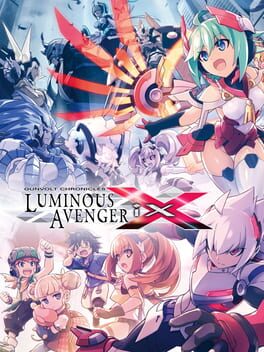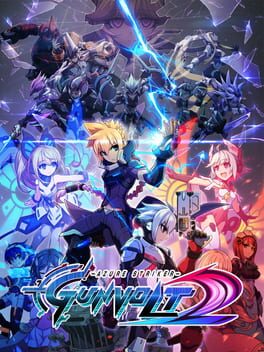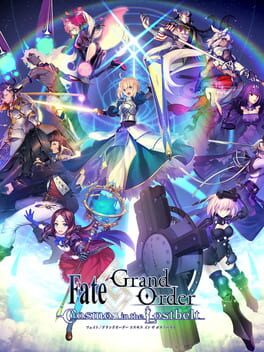CapitalD
2021
As I sat down and watched the credits roll after finishing a 12 hour reading session for Volume F, I might have relearned a lesson I learned many years ago. That I should never judge a book by its cover, or in Blue Archive's case, a book by its degeneracy. Blue Archive is truly a fantastic heart-warming story that is so earnest with how it portrays its themes via the multiple stories it provides.
Based on the stuff I've seen online, I expected this to be a pretty safe slice of life-ish gacha story, that would be good, but ultimately forgettable. The first two volumes exceeded that expectation, with the underlying message about an adult's role to guide young adolescents into growing and understanding what their goals are and how to achieve them elevating the pretty fun slice of life scenes and the serious moments when the plots get more involved with more stakes. Kivotos as a setting for Blue Archive expands the limits of what Blue Archive can do. It is both a very exaggerated and silly place that seems almost like a parody of slice of life series with how nonsensical many aspects of Kivotos work and are taken as the norm. But at the same time, these oddities are sometimes questioned and are used to expand the world, with raid monsters being these weird eldritch creatures, the main villain group Gematria having surprisingly cool and abstract character design, which makes the world mysterious in a way that makes you want to learn more about it while being vague enough that the writers can do pretty much anything for stories (kind of similar to Touhou now that I think about it).
The overall writing is very sharp and to the point, emphasizing lines that give situations more impact, both for levity and for serious moments, while having very little bloat (aka Arknights) present. There was a scene involving a bridge that takes place late in Volume 3 that conveyed a lot about two characters relationship with few lines of text, which really impressed me, especially coming from reading many Arknights events. Pivotal story moments near the ends of each Volume are voiced too, which greatly enhances the emotional impact of certain scenes.
Eden's Treaty surprised me though, with it ending up as one of the best stories I've read in a gacha (only behind FGO's Avalon le Fae as an absolute favorite). The entire conflict between Trinity and Gehenna and how the narrative explored the themes of communication via the irrational hatred both groups both hold for each other, the inherent flaw in trying to understand others, and the futility of living for a purpose, but to pursue a happy ending for everyone despite those logical fallacies was just so incredibly well executed and explored that it got me to really appreciate how uplifting and positive Blue Archive's story ultimately is, despite all the hardships and despair that can occur. Hifumi's "I love clichés" speech encapsulates everything about the optimistic themes of Blue Archive so well and made me tear up with how genuine and earnest it felt. Volume F continued the bar for high quality story-telling, delving more into choosing to live, despite all the bad circumstances in your life, and the role of an adult shouldering the mistakes a youth can make when they can rely on no one. The entire ending sequence of Volume F though was fantastic and captivated me from start to finish, making up for some bloated pacing during the battle scenes near the middle.
The characters are all very fun to see interact and do shenanigans with, which makes it very easy to be invested in them when the stakes raise and the students have to go through some real hardships. The group dynamics with each student in their specific club and school really allow some of these characters, despite not being the deepest, to just be really fun to watch act on screen (Make-Up Work Club my beloved). Not every character is the most complex or fleshed out, but the characters that are especially focused on (Mika, Saori, Terror Shiroko, etc.) are wonderfully explored and have lots of catharsis tied to their flawed ideologies, yet are guided to hope and grow through their Sensei.
Sensei, while being a self-insert, is a pretty damn good one, being a symbol of an adult just trying to lead their beloved students to a brighter future, despite the influence of corrupt deceitful adults that exist in the world (Gematria, Kaiser Corp, etc.). There is some degeneracy to the character, but the gigantic positive influence Sensei has on the students lives and struggles made me like Sensei as something much more than just a simple gacha self-insert protagonist. The students all get a lot of love too when pulled for, with each character having a unique Live2D lobby animation, and a support chain of events you can perform. These events range from very nice resolutions to story events, very silly but overall fun reads, to completely degenerate. There is LOTS to love about Blue Archive's cast and how the game treats them.
The music is fantastic, with it leaning very heavily into EDM style tracks. Story themes are very memorable and catchy listens, and the core battle themes and important songs in big moments being amazing (RE Aoharu, Alkaline Tears, Defective Pixel, Usagi Flop, too many more to count). It elevates a great story even more and makes the atmosphere very unique compared to other gacha stories.
If this was just a visual novel, I would probably come out loving Blue Archive, but unfortunately, this game is a gacha. To be fair, the game does use the fact that its a gacha for its story extremely well, with each Volume being very distinct from each other and exploring the multitude of students that exist in Kivotos rather than focusing on one centralized cast. But the gacha means that the actual gameplay is kind of bad... It's harmless auto battler stuff, with you selecting skills at the right times and timing skills for good positioning, but I just find that style of gameplay tedious and boring to deal with. The rates look great on paper (3% for a max rarity unit, 6% during certain limited banners), but the focus only being 0.7% means you'll have to spark most of the time (200 pulls) to get the desired unit you'd want. This is actually not the worst, as the average time to get enough currency to spark is 2 months, but the rates do look better than they actually are in terms of getting a focus.
Something that is greatly appreciated is how much this game respects your time, at least once the ball gets going with mission progress on your account. You can skip almost every daily task in the game with a simple sweep command, reaping all the rewards while skipping the tedium of the combat completely once you beat the node with a 3 star rating at least once. This significantly boosted my attention rate in this game, making it possible for me to focus entirely on the story without worrying too much about the gacha and being optimal, just sweeping dailies and completing missions effortlessly to idly progress. Story progression is rarely locked behind the gacha as well (with a few very notable exceptions), meaning that your story progress is moreso locked behind your account level rather than having the most optimal students and building a meta team. This again focuses the attention of the game less on meta and pulling for broken students, and more on just pulling for your favorites, to get their Live2D's, to see more of their characters in their Momotalk. The focus of Blue Archive is always on the students, no matter what.
Despite the actual game portion of Blue Archive being underwhelming to me, Blue Archive as a whole is a great time if taken as a visual novel, and is also so easy to maintain. Dailies take at most 3-5 minutes (unless raid events are happening), and all previous nodes can be swept at no additional stamina cost (unlike something like Limbus). One of my favorite gachas, and I'll definitely stick around for Arc 2.
Based on the stuff I've seen online, I expected this to be a pretty safe slice of life-ish gacha story, that would be good, but ultimately forgettable. The first two volumes exceeded that expectation, with the underlying message about an adult's role to guide young adolescents into growing and understanding what their goals are and how to achieve them elevating the pretty fun slice of life scenes and the serious moments when the plots get more involved with more stakes. Kivotos as a setting for Blue Archive expands the limits of what Blue Archive can do. It is both a very exaggerated and silly place that seems almost like a parody of slice of life series with how nonsensical many aspects of Kivotos work and are taken as the norm. But at the same time, these oddities are sometimes questioned and are used to expand the world, with raid monsters being these weird eldritch creatures, the main villain group Gematria having surprisingly cool and abstract character design, which makes the world mysterious in a way that makes you want to learn more about it while being vague enough that the writers can do pretty much anything for stories (kind of similar to Touhou now that I think about it).
The overall writing is very sharp and to the point, emphasizing lines that give situations more impact, both for levity and for serious moments, while having very little bloat (aka Arknights) present. There was a scene involving a bridge that takes place late in Volume 3 that conveyed a lot about two characters relationship with few lines of text, which really impressed me, especially coming from reading many Arknights events. Pivotal story moments near the ends of each Volume are voiced too, which greatly enhances the emotional impact of certain scenes.
Eden's Treaty surprised me though, with it ending up as one of the best stories I've read in a gacha (only behind FGO's Avalon le Fae as an absolute favorite). The entire conflict between Trinity and Gehenna and how the narrative explored the themes of communication via the irrational hatred both groups both hold for each other, the inherent flaw in trying to understand others, and the futility of living for a purpose, but to pursue a happy ending for everyone despite those logical fallacies was just so incredibly well executed and explored that it got me to really appreciate how uplifting and positive Blue Archive's story ultimately is, despite all the hardships and despair that can occur. Hifumi's "I love clichés" speech encapsulates everything about the optimistic themes of Blue Archive so well and made me tear up with how genuine and earnest it felt. Volume F continued the bar for high quality story-telling, delving more into choosing to live, despite all the bad circumstances in your life, and the role of an adult shouldering the mistakes a youth can make when they can rely on no one. The entire ending sequence of Volume F though was fantastic and captivated me from start to finish, making up for some bloated pacing during the battle scenes near the middle.
The characters are all very fun to see interact and do shenanigans with, which makes it very easy to be invested in them when the stakes raise and the students have to go through some real hardships. The group dynamics with each student in their specific club and school really allow some of these characters, despite not being the deepest, to just be really fun to watch act on screen (Make-Up Work Club my beloved). Not every character is the most complex or fleshed out, but the characters that are especially focused on (Mika, Saori, Terror Shiroko, etc.) are wonderfully explored and have lots of catharsis tied to their flawed ideologies, yet are guided to hope and grow through their Sensei.
Sensei, while being a self-insert, is a pretty damn good one, being a symbol of an adult just trying to lead their beloved students to a brighter future, despite the influence of corrupt deceitful adults that exist in the world (Gematria, Kaiser Corp, etc.). There is some degeneracy to the character, but the gigantic positive influence Sensei has on the students lives and struggles made me like Sensei as something much more than just a simple gacha self-insert protagonist. The students all get a lot of love too when pulled for, with each character having a unique Live2D lobby animation, and a support chain of events you can perform. These events range from very nice resolutions to story events, very silly but overall fun reads, to completely degenerate. There is LOTS to love about Blue Archive's cast and how the game treats them.
The music is fantastic, with it leaning very heavily into EDM style tracks. Story themes are very memorable and catchy listens, and the core battle themes and important songs in big moments being amazing (RE Aoharu, Alkaline Tears, Defective Pixel, Usagi Flop, too many more to count). It elevates a great story even more and makes the atmosphere very unique compared to other gacha stories.
If this was just a visual novel, I would probably come out loving Blue Archive, but unfortunately, this game is a gacha. To be fair, the game does use the fact that its a gacha for its story extremely well, with each Volume being very distinct from each other and exploring the multitude of students that exist in Kivotos rather than focusing on one centralized cast. But the gacha means that the actual gameplay is kind of bad... It's harmless auto battler stuff, with you selecting skills at the right times and timing skills for good positioning, but I just find that style of gameplay tedious and boring to deal with. The rates look great on paper (3% for a max rarity unit, 6% during certain limited banners), but the focus only being 0.7% means you'll have to spark most of the time (200 pulls) to get the desired unit you'd want. This is actually not the worst, as the average time to get enough currency to spark is 2 months, but the rates do look better than they actually are in terms of getting a focus.
Something that is greatly appreciated is how much this game respects your time, at least once the ball gets going with mission progress on your account. You can skip almost every daily task in the game with a simple sweep command, reaping all the rewards while skipping the tedium of the combat completely once you beat the node with a 3 star rating at least once. This significantly boosted my attention rate in this game, making it possible for me to focus entirely on the story without worrying too much about the gacha and being optimal, just sweeping dailies and completing missions effortlessly to idly progress. Story progression is rarely locked behind the gacha as well (with a few very notable exceptions), meaning that your story progress is moreso locked behind your account level rather than having the most optimal students and building a meta team. This again focuses the attention of the game less on meta and pulling for broken students, and more on just pulling for your favorites, to get their Live2D's, to see more of their characters in their Momotalk. The focus of Blue Archive is always on the students, no matter what.
Despite the actual game portion of Blue Archive being underwhelming to me, Blue Archive as a whole is a great time if taken as a visual novel, and is also so easy to maintain. Dailies take at most 3-5 minutes (unless raid events are happening), and all previous nodes can be swept at no additional stamina cost (unlike something like Limbus). One of my favorite gachas, and I'll definitely stick around for Arc 2.
Fantastic game that gets held back via padding and a messy conclusion. The combat was great as usual, and even fixed many complaints I had with Remake's combat (bad air combat and no parrying without materia). Music was INCREDIBLE. The OST was probably the most varied I've heard in a very long time, with both rearranged versions of the original songs and the new ones all being joys to listen to. Lots of minigames too, with some being surprisingly addicting (Queen's Blood my beloved) and others being horrible to go through for high scores (any shooting game). Luckily, most of the minigames are optional for needing a high score, so I don't see them as too big of an issue.
The open world was a bit of a mixed bag for me. On one hand, it was straight up incredible to see some locations in the original (Kalm and Cosmo Canyon had me shook) greatly expanded on in Rebirth. On the other hand, the world map is padded to the brim with Ubisoft-tier objectives, with icons there just to do some busy work. Some of these I didn't mind (Protorelics), but others like the towers were just mindless fluff.
The best aspect of the game for me by far were the characters. The party dynamic feels so fleshed out, nuanced, and everyone gets a deeper layer to them that wasn't present in the original due to the system limitations. I think my favorites ended up being Barret and Tifa at the end, but everyone got a glow up in some way. They actually made Cait Sith into a GOAT, just think about that... The characters are what made me not mind the excessive padding issues the game has, as the slog usually has some character banter that just gives you more time to enjoy this amazing ensemble. The characters also make the side-quests well worth doing, as each side quest has a party member attached to it, giving you more time to see the party interact, and even have some more nuanced development in certain cases.
The characters also complement an aspect of the original that they kept wholeheartedly, the humor. This might be one of the funniest games I've played in my life, with a certain card sequence with Red XIII having me in stitches. I'm glad they kept to the general weirdness the original game had and didn't try to make it more serious than it was (no Advent Children tone shifts here).
And yeah, the ending was a bit of a clusterfuck. It didn't ruin the game by any means, but watching that entire sequence made me think how much more I would like the game if it was straight up faithful without any of the new stuff. I can't say definitively if the new content is BAD, since I don't know how it ends. But regardless of that, the overall presentation of the story in that segment was very convoluted, messy, and just confusing.
But overall, I loved this game so much. I very much look forward to Part 3, when it drops in 2028.
The open world was a bit of a mixed bag for me. On one hand, it was straight up incredible to see some locations in the original (Kalm and Cosmo Canyon had me shook) greatly expanded on in Rebirth. On the other hand, the world map is padded to the brim with Ubisoft-tier objectives, with icons there just to do some busy work. Some of these I didn't mind (Protorelics), but others like the towers were just mindless fluff.
The best aspect of the game for me by far were the characters. The party dynamic feels so fleshed out, nuanced, and everyone gets a deeper layer to them that wasn't present in the original due to the system limitations. I think my favorites ended up being Barret and Tifa at the end, but everyone got a glow up in some way. They actually made Cait Sith into a GOAT, just think about that... The characters are what made me not mind the excessive padding issues the game has, as the slog usually has some character banter that just gives you more time to enjoy this amazing ensemble. The characters also make the side-quests well worth doing, as each side quest has a party member attached to it, giving you more time to see the party interact, and even have some more nuanced development in certain cases.
The characters also complement an aspect of the original that they kept wholeheartedly, the humor. This might be one of the funniest games I've played in my life, with a certain card sequence with Red XIII having me in stitches. I'm glad they kept to the general weirdness the original game had and didn't try to make it more serious than it was (no Advent Children tone shifts here).
And yeah, the ending was a bit of a clusterfuck. It didn't ruin the game by any means, but watching that entire sequence made me think how much more I would like the game if it was straight up faithful without any of the new stuff. I can't say definitively if the new content is BAD, since I don't know how it ends. But regardless of that, the overall presentation of the story in that segment was very convoluted, messy, and just confusing.
But overall, I loved this game so much. I very much look forward to Part 3, when it drops in 2028.
Really good intro for Yuffie's character in Remake. Feels pretty faithful to her character in the original, and her dynamic with Sonon is really fun to watch. Yuffie is also a really technical glass cannon to play too, making her really flexible and fun to use in combat. The new remixes, 10/10 as well. Can't wait for Rebirth!
An amazing tribute to SMT, and a great Touhou fangame as well. The feeling of old-school dungeon crawling, accompanied by grungy SNES-esque music, framed by the variety of wonderful 16-bit aesthetics painting each of the numerous dungeons gave me such a nostalgic throwback towards a genre of game I've rarely dug into.
The battle system felt great to use as well, with animations being fast and flashy (with options to speed them up even further), and the gameplay loop of exploiting weaknesses, buff, debuffs, and SP, made normal fights and bosses feel dynamic for a majority of my time with the game.
To top it off, the game never felt unfair, and felt surprisingly balanced, despite how many 2hu's there were to hijack and fuse. The amount of team-building options lets you either constantly fuse new 2hu's in your party to build around each dungeon, or continually make your group of favorites stronger. Neither playstyle felt any less valid to use, which made team building feel liberating and rewarding to pull off. Because of how flexible this was, I never felt the game to ever be overbearingly difficult (until the Final Boss and the postgame.....).
Overall, an excellent SMT-like dungeon crawler that I might see myself replaying in the future. So much content (30 hour playtime) for only 10 bucks too! Such a steal.
The battle system felt great to use as well, with animations being fast and flashy (with options to speed them up even further), and the gameplay loop of exploiting weaknesses, buff, debuffs, and SP, made normal fights and bosses feel dynamic for a majority of my time with the game.
To top it off, the game never felt unfair, and felt surprisingly balanced, despite how many 2hu's there were to hijack and fuse. The amount of team-building options lets you either constantly fuse new 2hu's in your party to build around each dungeon, or continually make your group of favorites stronger. Neither playstyle felt any less valid to use, which made team building feel liberating and rewarding to pull off. Because of how flexible this was, I never felt the game to ever be overbearingly difficult (until the Final Boss and the postgame.....).
Overall, an excellent SMT-like dungeon crawler that I might see myself replaying in the future. So much content (30 hour playtime) for only 10 bucks too! Such a steal.
2021
Pretty cool and enjoyable experience. Didn't cry, but some parts felt appropriately emotional, and the entire mechanic of blinking and advancing time was executed very well and felt appropriate for the story. The ending in particular was excellent. I kind of felt like I knew exactly what was going to happen (and I was right), but that doesn't take away from how good the overall execution was. If you have an afternoon to kill, this might be a good way to use your time.
2017
This is the first proper deck-builder roguelike game I've played and it's so fun! Runs are very lengthy (like an hour to an hour and a half long), yet the card variety and amount of cool card synergy in this game is crazy. The mana base system also allows each run to be unique and to go pretty crazy with your character builds. I had a Reimu A firepower build that slowly shifted towards summoning as many teammates to get as much passive buffs as possible while keeping my damage high, and it was so cool and fun! The music and aesthetic are what brought me to play this first over Slay the Spire, with both of these qualities being very high quality for a game like this. The card art ranges from gorgeous to very funny (Love the FUMO arts).
The game is at a decent level challenge-wise (it's my first deck-builder), with me winning 2 runs fully so far and 1 run to the normal final boss out of 10 runs. Four difficulty settings and many modifiers exist to make the game even harder if necessary.
Will definitely be playing more since it's so addictive and fun to mess around with card synergies.
The game is at a decent level challenge-wise (it's my first deck-builder), with me winning 2 runs fully so far and 1 run to the normal final boss out of 10 runs. Four difficulty settings and many modifiers exist to make the game even harder if necessary.
Will definitely be playing more since it's so addictive and fun to mess around with card synergies.
2013
Did the Gilgamesh route and CCC ending. Definitely plan to do all the Servant endings.
What a giant improvement on Extra in almost everyway. I really enjoyed the shift towards being more of a visual novel than a dungeon crawler, since the combat system was so bad in Extra (it still is). The deep dive on love in many forms, through the overt horniness of the game on a fundamental level were both hilarious and insightful towards the story. Characters were also so much better than in Extra, with characters I didn't care about in that game (Gatou, Leo, even SHINJI) having amazing moments and characterization, and the new characters being great additions to the cast, with special mention to BB. FANTASTIC soundtrack as well. They cooked so hard....
What a giant improvement on Extra in almost everyway. I really enjoyed the shift towards being more of a visual novel than a dungeon crawler, since the combat system was so bad in Extra (it still is). The deep dive on love in many forms, through the overt horniness of the game on a fundamental level were both hilarious and insightful towards the story. Characters were also so much better than in Extra, with characters I didn't care about in that game (Gatou, Leo, even SHINJI) having amazing moments and characterization, and the new characters being great additions to the cast, with special mention to BB. FANTASTIC soundtrack as well. They cooked so hard....
2023
HORRBILE gameplay with repetitive musou combat and bloated HP bars, and BREAK bars that take forever to kill. Soundtrack is pretty good. Story is alright until NG+, which is where the main character gets a lot more substantial development, and a secret ending. Why they locked this behind NG+ is beyond me, but at least it's there. Characters were pretty fun, with the best being Saber and Iori and their interactions. Overall, I'm decently satisfied, but the initial reviews of the game had me expecting a lot more from the story, and especially the gameplay.
2010
This game actually slaps with how fast paced and addicting the movement and scoring system are with both GV and Copen. Definitely prefer Copen's pinball esque playstyle over GV but GV is still really fun to play as. Only complaint is without self-inflicted restraints, the game is way too easy. But it is just so fun to go fast and move fluidly in this game it doesn't really matter to me.
Part 2 of FGO is a noticeable improvement in terms of consistency. There really isn't many straight up bad chapters unlike certain parts of Parts 1 and 1.5 (maybe Heian-Ko but that's one chapter of eight released in EN so far), with the worst of the chapters just pretty slow and boring at points, unlike utter embarrassments like Septem and Agartha were. Part 2 is just a solid romp through some conceptually interesting scenarios, with a pretty interesting moral dilemma with what happens to the worlds left behind after each chapter is completed.
Nothing mind-blowing is present, but the best aspects of Part 2 are the really entertaining and fun characters that are just a blast to read the interactions and dynamics of. Lostbelt 5.1 Atlantis was a standout due to how fun and dynamic the ensemble cast was with each other, the highlights being Jason and Mandricardo. Shoutout to Wodime too for having an incredible backstory and motives, that was unfortunately locked to a pretty inconsistent chapter. Part 2 is mostly very enjoyable to read, but nothing as amazing as some other Type Moon works can get (Mahoyo, Hollow Ataraxia, TsukiRe, etc.)
UNTIL LOSTBELT 6 ROLLS AROUND AND HOLY SHIT, NASU REALLY WROTE AN ENTIRE FANTASY EPIC THAT'S AS LONG AS A VN, FOR A GACHA GAME????????
Avalon le Fae is an incredible piece of writing that is unfortunately trapped behind a giant time commitment that is playing Fate/Grand Order. Nearly all the complaints I have about the story are because of FGO as a game itself (bad VN presentation, Ritsuka is literally a plank of wood for a main protagonist, lack of descriptive prose whenever the perspective is on Ritsuka).
Nearly everything quality aspect from the "main" Type-Moon VNs and works is present. Compelling main characters, that all have amazing dynamics and parallels with each other that reinforce the themes of the story. There's even direct thematic parallels to the original Stay Night VN! The central characters stand with the best of the Nasuverse characters, with characters like Artoria Caster, Oberon, and Morgan standing alongside some of my other favorites in the series (Shirou, Angra Maiyuu, Ryougi, Ciel, etc.) Incredibly detailed world-building that make the setting feel so lived in and authentic. A wide variety of side characters that almost all have depth much deeper than most other side characters in FGO have. A level of introspection and narrative depth present that is equivalent to Nasu's bigger works, due of the reintroduction of lots of descriptive prose during key moments of the story. Many of the new songs in the chapter were great, which is surprising considering FGO's music is mediocre to bad. So many staples from a quality Type-Moon work come back in such a triumphant way here, which is unexpected for a story written for a gacha game of all things. And the best part is that most of the story is amazing on a stand-alone level, and not chained to needing to keep up with the overarching story of FGO.
More needs to be said about the sheer sense of scale and scope in Avalon le Fae. There are so many intersecting and seemingly disconnected parts that reconnect and are recontextualized in unexpected, yet impactful ways. One of the main themes of the chapter is finding your star and how this simplistic line applies to so many characters and relates to why the central conflicts and tragedy that can occur in the world happens is the core to the story. Artoria Caster as a character and how she parallels and contrasts with the Artoria from Proper Human History transforms what could be a very typical hero's journey into a tragic, yet hopeful introspection on duty and responsibility, and the ways they can be overcome. She stands among the best of the best of characters in the Nasuverse.
To elaborate on some flaws with the story briefly, they are alleviated a bit by having Ritsuka serve as a supporting character to the real protagonist of the chapter, Artoria Caster. Having to shove in some battles for the sake of having actual gameplay made some story segments a bit awkward to read through as well, but it is nowhere near as bad as it was with chapters like Camelot did it in Part 1. Some characters had depth still, but could have been even better if given more time to have been fleshed out, but it is understandable that Nasu would not want to make the chapter too long for a gacha game (even though the chapter we have now is like 30 hours long lol).
It is EXTREMELY hard to elaborate why Avalon le Fae is such an incredible experience without spoiling anything, but it is just a shame that more people can't read it due to the giant accessibility barrier of playing a long-running gacha game. If you are down the hole of consuming lots of Type-Moon/Fate media, or just want to commit to another gacha game, Avalon le Fae will pay your commitment in spades, rewarding you with one of Nasu's best narratives. Really hope Lostbelt 7 can maintain at least some of the quality of Lostbelt 6.
Nothing mind-blowing is present, but the best aspects of Part 2 are the really entertaining and fun characters that are just a blast to read the interactions and dynamics of. Lostbelt 5.1 Atlantis was a standout due to how fun and dynamic the ensemble cast was with each other, the highlights being Jason and Mandricardo. Shoutout to Wodime too for having an incredible backstory and motives, that was unfortunately locked to a pretty inconsistent chapter. Part 2 is mostly very enjoyable to read, but nothing as amazing as some other Type Moon works can get (Mahoyo, Hollow Ataraxia, TsukiRe, etc.)
UNTIL LOSTBELT 6 ROLLS AROUND AND HOLY SHIT, NASU REALLY WROTE AN ENTIRE FANTASY EPIC THAT'S AS LONG AS A VN, FOR A GACHA GAME????????
Avalon le Fae is an incredible piece of writing that is unfortunately trapped behind a giant time commitment that is playing Fate/Grand Order. Nearly all the complaints I have about the story are because of FGO as a game itself (bad VN presentation, Ritsuka is literally a plank of wood for a main protagonist, lack of descriptive prose whenever the perspective is on Ritsuka).
Nearly everything quality aspect from the "main" Type-Moon VNs and works is present. Compelling main characters, that all have amazing dynamics and parallels with each other that reinforce the themes of the story. There's even direct thematic parallels to the original Stay Night VN! The central characters stand with the best of the Nasuverse characters, with characters like Artoria Caster, Oberon, and Morgan standing alongside some of my other favorites in the series (Shirou, Angra Maiyuu, Ryougi, Ciel, etc.) Incredibly detailed world-building that make the setting feel so lived in and authentic. A wide variety of side characters that almost all have depth much deeper than most other side characters in FGO have. A level of introspection and narrative depth present that is equivalent to Nasu's bigger works, due of the reintroduction of lots of descriptive prose during key moments of the story. Many of the new songs in the chapter were great, which is surprising considering FGO's music is mediocre to bad. So many staples from a quality Type-Moon work come back in such a triumphant way here, which is unexpected for a story written for a gacha game of all things. And the best part is that most of the story is amazing on a stand-alone level, and not chained to needing to keep up with the overarching story of FGO.
More needs to be said about the sheer sense of scale and scope in Avalon le Fae. There are so many intersecting and seemingly disconnected parts that reconnect and are recontextualized in unexpected, yet impactful ways. One of the main themes of the chapter is finding your star and how this simplistic line applies to so many characters and relates to why the central conflicts and tragedy that can occur in the world happens is the core to the story. Artoria Caster as a character and how she parallels and contrasts with the Artoria from Proper Human History transforms what could be a very typical hero's journey into a tragic, yet hopeful introspection on duty and responsibility, and the ways they can be overcome. She stands among the best of the best of characters in the Nasuverse.
To elaborate on some flaws with the story briefly, they are alleviated a bit by having Ritsuka serve as a supporting character to the real protagonist of the chapter, Artoria Caster. Having to shove in some battles for the sake of having actual gameplay made some story segments a bit awkward to read through as well, but it is nowhere near as bad as it was with chapters like Camelot did it in Part 1. Some characters had depth still, but could have been even better if given more time to have been fleshed out, but it is understandable that Nasu would not want to make the chapter too long for a gacha game (even though the chapter we have now is like 30 hours long lol).
It is EXTREMELY hard to elaborate why Avalon le Fae is such an incredible experience without spoiling anything, but it is just a shame that more people can't read it due to the giant accessibility barrier of playing a long-running gacha game. If you are down the hole of consuming lots of Type-Moon/Fate media, or just want to commit to another gacha game, Avalon le Fae will pay your commitment in spades, rewarding you with one of Nasu's best narratives. Really hope Lostbelt 7 can maintain at least some of the quality of Lostbelt 6.
